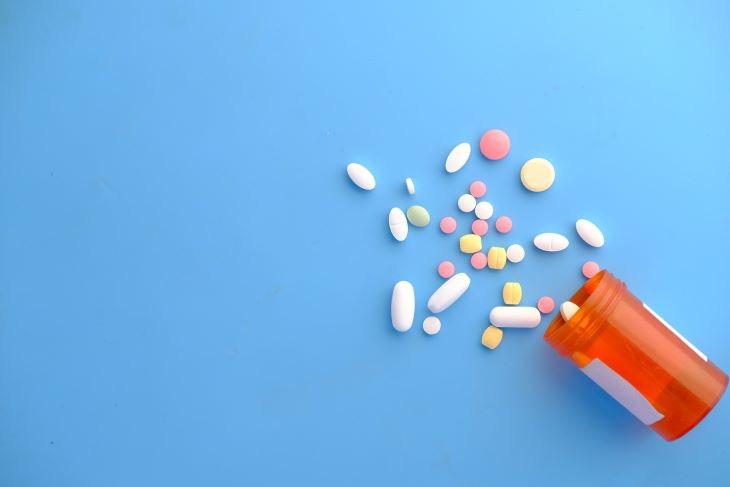How Long Does Valium Stay in Your System?
Valium, which has also been known or marketed as Diazepam, is a benzodiazepine which is a type of depressant drug.
Since it is a benzodiazepine, you may hear Valium being referred to by some other names such as “benzos”, however, “benzos” could also refer to something other than Valium.
It is a drug which is prescribed as a sedative in order to prevent seizures and muscle spasms, among other symptoms.
Don’t let addiction control your life – get the help you need from a drug and alcohol rehab by calling our team on 0800 088 66 86
Is Valium Legal or Illegal?

Valium is a drug which is prescribed by doctors for patients who suffer from symptoms such as anxiety disorder, restlessness, insomnia, panic attacks, and much more.
It is a legal drug which is presented in the form of a pill for patients to swallow while adhering to the doctor’s daily recommendations.
However, some doctors have become reluctant to prescribe the drug due to its addictive nature and the complications that it can bring if people not only misuse it but mix it with other substances (which is called poly-drug use).
However, some people may treat Valium as a recreational drug. Not only do people who have a prescription use Valium in excessive quantities, those who do not have a prescription also consume the substance in order to experience its sedative effects.
1. How is Valium Consumed?
Some people may swallow it as a pill, whereas others may crush it down in order to snort, or even melt it down for it to be injected. Injecting a substance can lead to the consumer experiencing its high and euphoric effects within minutes, and the effects can last as long as an hour.
Due to the immediate and intensified effects, it places subjects at more risk of developing an addiction to Valium.
Snorting Valium will also allow the consumer to experience its effects sooner than swallowing it in pill form, which requires more time for the effects to be experienced.
Valium can also be consumed through a rectal gel, although this is a less common form of consumption. Applying rectal gel can still cause a physical dependence to Valium along with injecting, snorting, and swallowing.
2. What Are the Effects of Valium?
Valium was approved by the Food and Drug Administration (FDA) in 1963, and is prescribed to patients in order to treat health conditions and psychological or physical symptoms such as anxiety, insomnia, restlessness, panic attacks, seizures, alcohol and opiate withdrawal, and other issues.
It has a relaxing and sedating effect which is influential in calming patients who are prone to restlessness and anxiety, or are about to undergo some sort of surgery.
Since it is a depressant, this reduces activity in the brain and the central nervous system. By doing so, the drug can help patients feel more relaxed and relieve them of hyperactivity.
Is Valium Addictive?

While Valium offers a range of benefits for patients suffering from issues such as anxiety, panic attacks, restlessness, and more, it has proved to be addictive. Consuming Valium frequently and in excess of your medical instructions and prescription can be harmful and present many negative effects.
When prescribed by a physician in moderate quantities, Valium can benefit patients who are suffering from a range of conditions.
However, frequent and excessive Valium consumption can lead to not only addiction but a range of physical and psychological problems.
Some of the side effects associated with frequent and excessive Valium consumption include:
- Muscle Weakness, Lack Of Coordination, Slurred Speech: Because it is a depressant, Valium can lead to feelings of muscle weakness, lethargy, and a lack of coordination in movements.
- Drowsiness: Potentially one of the most common symptoms of Valium consumption, patients tend to find it difficult concentrating.
- Dizziness: Patients may experience episodes of dizziness, and it is important that they do not drive or operate any machinery which requires utmost concentration and coordination.
- Confusion: Subjects consuming Valium may experience confusion
- Depression and Suicidal Ideation: Withdrawal of Valium can lead to amplified symptoms of depression, such as self loathing, suicidal ideation, hopelessness, and more.
- Behavioural Problems, Irritability, Hostility: Valium use can cause a mixture of emotions among users, and it can lead to negative emotions such as irritability and hostility.
- Memory Loss: Long term use of Valium can lead to memory loss if consumed in excessive quantities. This is the case for both short term and long term memorisation.
- Seizures: While Valium may be prescribed in order to prevent or minimise the severity of seizures, especially during a medicated detox at rehab, there can be complications suddenly abstaining from Valium. Abstaining from Valium may lead to seizures, especially if the user is highly dependent on Valium.
Although it is very effective at treating particular patients and their unique symptoms, the drug can be ‘misused’ or ‘abused’, which means that it can be used for purposes other than medical treatment and used in excessive quantities.
Using Valium in this fashion can lead to a high level of dependence and addiction. The addiction potential with Valium is relatively high, especially when people are using the drug in a way which goes against their prescription.
When someone is suffering from an addiction, the reward pathways in their brain (which are called the mesolimbic pathways) have been restructured in a way which makes them dependent on an addictive substance to release dopamine and other euphoric chemicals.
While this may not sound too consequential, it means that the person who is addicted struggles to replicate the same feelings of euphoria with other and more natural activities.
Furthermore, this person who is physically dependent on Valium (or any substance) will begin to experience a range of withdrawal symptoms which act as cravings and expose them to not only relapsing but also physical and psychological harm.
Some of the most common examples of withdrawal symptoms include headaches, erratic behaviour, vomiting, stroke, seizures, and so on.
Overcome your valium addiction with the help of a professional rehab centre by talking to our experts on 0800 088 66 86
Poly-Drug Use: Mixing Valium With Other Substances

Poly-drug use is the use of two or more drugs simultaneously. Commonly, people consume an addictive substance, whether it be Valium, cannabis, or cocaine, with alcohol.
This is because alcohol is much more mainstream and normalised in our society.
However, there are many ways in which Valium is mixed with other substances, and this can cause a range of health complications.
Some people may mix substances with Valium in order to amplify its euphoric effects. However, others may be engaging in polydrug use without actually realising what they are doing. They may not be aware of the dangers of mixing Valium with other substances.
1. Mixing Valium With Other Depressants (e.g. Alcohol)

Mixing a depressant such as Valium with other depressants, such as alcohol, can lead to a range of consequences which stem from being vulnerable due to an excessively depressed central nervous system.
Because of this, it is important to understand how long Valium stays in the body, and its effects, in order for people to avoid poly-drug use.
Depressants have many effects, such as slowing down the respiratory system, decreasing heart rate, and so on.
So, when someone consumes their daily limit of depressants through Valium, and then continues to indulge in other depressants such as alcohol, they may suffer profoundly from many health problems.
Some of the health problems which can arise from poly-drug use with Valium can come in the form of things such as cardiac arrest, stroke, seizures, brain damage, and they can even die due to irresponsible consumption.
Additionally, poly-drug users will also be much more exposed and vulnerable to accidents and injuries due to the amplified effects of loss of motor skills and coordination.
If someone is suffering from an addiction to either Valium or alcohol, or both, they will be required to undergo an addiction treatment programme at a drug and alcohol rehab.
2. Mixing Valium With Other Stimulants (e.g. Cocaine, Methamphetamines)

People who are looking to become more energetic (and to counteract the effects of Valium) may turn towards consuming stimulants such as cocaine or methamphetamines. However, combining a depressant, such as Valium, and a stimulant drug can lead to a range of adverse effects on the body.
Mixing a drug which slows down activity in your brain and central nervous system, such as a depressant, with another drug which increases the level of activity in the brain and nervous system can cause a negative reaction in the body.
The brain and central nervous system are receiving contradicting signals and chemicals.
This can lead to the user suffering from problems such as an irregular heartbeat, heart attack, stroke, seizures, or even death.
Don’t take the risk of mixing valium and another substance – get the help you need to beat your addiction by calling us on 0800 088 66 86
How Long After You Consume Valium Does It Remain In Your Body?

It is very important to understand how long Valium is effective in your system and for how long it remains detectable.
Due to the health complications which can occur if someone mixes Valium with another substance, whether inadvertently or not, it is also important to know when Valium is still present in your system.
It’s also important to understand that Valium will stay in someone’s system, and be detectable, for longer than the time it takes for its effects to wear off.
Just because the effects may have worn off, it does not mean that the drug is not still detectable and active in your body.
1. How Long Do the Effects of Valium Last?

It depends on how the Valium is consumed. For example, injecting the substance will cause its effects to manifest sooner, but they will also dissipate sooner. Swallowing the drug will take longer for its effects to surface, but its effects will also last longer.
The physical and psychological effects of Valium may last from around 4 to 6 hours.
During this time, it is especially dangerous to mix Valium with other substances because its effects are at their most potent.
It is estimated that Valium typically takes a few days to leave the system, however, it can remain for around 10 days after consumption before fully leaving the system.
However, Valium’s half-life is around 30 to 56 hours. The term “half-life” refers to how the period it takes for half of the substance to leave the body.
Additionally, its metabolites are still detectable even when the drug has left the system. This means that Valium is detectable for a considerable amount of time even when its effects have waned.
2. How Long is it Detectable For?

There are different methods of detecting Valium, and therefore, there are different answers to this question.
Additionally, factors such as how much they are consuming, age, metabolism, body fat percentage, and so on have an effect on how detectable the substance is.
If someone’s liver is compromised, it may also take longer for the Valium to be fully processed.
However, the most common forms of testing for Valium in the body are through testing urine, saliva, blood, samples and hair follicles.
- Urine Testing: It is estimated that Valium is detectable from one to six weeks in the user’s urine since their last consumption. The detection window makes urine tests one of the more popular ways to screen for the drug.
- Saliva Samples: Traces of Valium are detectable through saliva samples for up to 10 days. However, the test can prove to be inconclusive or unreliable if the subject is suffering from symptoms such as dehydration.
- Blood Tests: Saliva is detectable in someone’s blood samples from around 6 to 48 hours. Since this has a much shorter detection window than other tests such as urine or saliva samples, blood samples are not used as frequently than other methods of testing.
- Hair Follicles: Valium can be detected in someone’s hair follicles for up to 90 days. Despite its long detection window, this is not a common method of detecting because it may not be as reliable as other forms of detection.
3. Why Would I Be Tested for Valium If It Is Legal?

Although it is a prescription drug, making it legal, it is still possible that you will be screened for Valium in your system. There are a few reasons for this.
One is that a doctor may want to prescribe a new form of medication to a patient, however, they may not be able to do so until the Valium is absent from the body.
Another reason is that employers may want to know that their potential or current employee is not consuming Valium as a recreational drug and is not prone to addiction.
Seeking Treatment at Rehab for Valium Addiction

If you are suffering from a Valium addiction, or an addiction to any other substance, it is important that you enter a drug and alcohol rehab in order to undergo the necessary treatment options.
At a drug and alcohol rehab, patients will undergo a comprehensive addiction treatment programme, either as an inpatient or an outpatient, and they will receive assistance and medical supervision from experienced medical health practitioners.
At a drug and alcohol rehab, patients will undergo a medically-assisted detox process if necessary. This will help them allow their addictive substance to leave the body safely and, in the case of a Valium detox, help to minimise withdrawal symptoms.
Withdrawal symptoms can be not only dangerous but potentially fatal depending on the severity of someone’s dependence to Valium and other substances.
The medicated detox will last around 7 to 14 days and patients will recover in a safe and comfortable facility.
After the medicated detox, patients will undergo a range of therapy and counselling sessions, including techniques such as Cognitive Behavioural Therapy, Dialectical Behavioural Therapy, Holistic Therapy, Family Therapy, and much more.
Patients will also learn about relapse prevention planning techniques in order to help them stay in recovery, and they may undergo an aftercare programme following their time at rehab.
Whatever the nature of your valium addiction, allow our expert team to help you by calling us today on 0800 088 66 86




